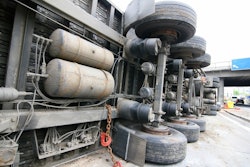
The report, approved by the Motor Carrier Safety Advisory Committee, was critical of the program in several ways, chief among them the low number of participants, relative to the number FMCSA said it would need to gauge Mexican carriers’ safety.
Only 13 Mexican carriers were participating in the program by its end, though more were needed, noted California Highway Patrol rep and subcommittee chair Janice Mulanix.
“Few of those were in the pilot program for more than 1 year,” the report notes. “Most of the vehicles and motor carriers in the pilot program did not engage in long-haul operations beyond the border commercial zones.”
And most of the inspections were completed within the border zone, Mulanix said, with fewer than 10 taking place outside of it. Mulanix also said only 5 percent of the trips by Mexican carrier participants were outside of the border zone, and 82 percent of the inspections were of just two of the carriers participating in the program.
The 13 carriers who were participating at the conclusion of the program this month now have standard operating authority in the U.S., meaning they can engage in operations outside of the border zone with all of their trucks and drivers.
Data from the MCS-150 show that 279 more Mexican power units from four carriers are now allowed to operate beyond the border zone.
Mexican carriers operating in the U.S., in the small sample of pilot carriers, had safety records that indicated better performance than the average of U.S. carriers, despite a very-high inspection rate of approximately 18 annual inspections per truck. By comparison, U.S. trucks on average receive just more than 1 inspection annually.
“The original criteria laid out by Congress was for there to be a representative sample of motor carriers that more or less could be extrapolated to the country,” noted Owner-Operator Independent Drivers Association Executive Vice President Todd Spencer.
However, carriers participating in the program have admitted to selecting their best trucks and drivers to participate in the program.
We took action on [October 13] to give the carriers still participating in the program standard authority,” said Quade. “We’re not making any determinations about the future of long-haul Mexican trucks at this time.
“We’ll wait for the report from this committee,” he told the MCSAC, “and the report from our Inspector General.”
The electronic logbooks participating carriers were equipped with – courtesy of the U.S taxpayer, noted OOIDA’s Spencer – have been “turned off,” Quade said. “I suspect most of them are going to paper logs…. We will continue to do inspections of logbooks at the border” and elsewhere. “For the four [pilot program carriers] with provisional authority — they all have to have [an annual] compliance review.”










